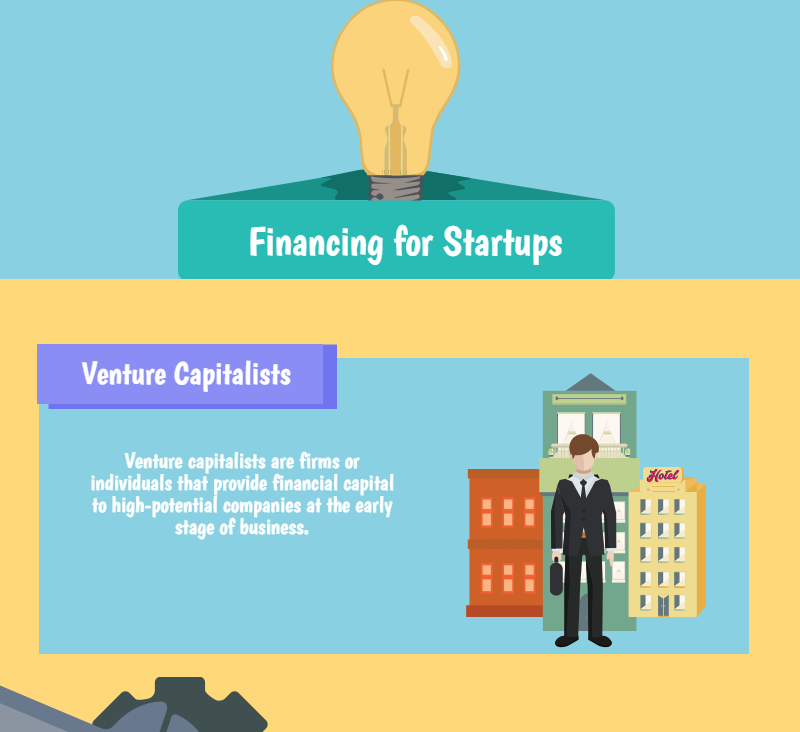Being an entrepreneur and starting your own business requires the need for funds. Finances are needed to maintain sufficient working capital, to purchase assets and to get the business off the ground. So where can you get these funds from? Read on to discover the best sources of finances for your startup.

Personal Finance
Most entrepreneurs resort to their own personal savings to fund their start-ups. It’s quick, accessible and probably the only choice many entrepreneurs have.
Pros
- Self-financing doesn’t have an approval process. It’s perhaps the easiest and quickest source of finance.
- Using personal funds is far less complex than involving a bunch of partners and shareholders and relinquishing control.
- Personal financing allows the entrepreneur to retain complete ownership and claim 100 percent of the profits.
Cons
- One of the major drawbacks of personal finance is limited availability. No matter how prudently these finances are allocated, they still might not be enough to ensure the future growth of the business.
- Employing personal savings is a major risk. If the business fails, the entrepreneur won’t have anything to fall back on.
- Limiting financing from personal savings isolates entrepreneurs from networking opportunities. There are no shareholders, investors or partners to consult and learn from.
Loans from Friends and Family
Borrowing from friends and family is quite similar to self-financing. A lot of entrepreneurs lacking personal funds turn to their family and friends for help.
Pros
- Family or friends will be willing to lend money if they believe in the idea of the business. They wish the best without any malicious intentions.
- Again, there is no complexity involved with getting approval. All you have to do is convince your family and friends that your business is worth the investment.
Cons
- Things can quickly go sour and relationships can be ruined, especially if the business doesn’t take off.
- Even though there is no official approval process, it can be difficult to persuade friends and family to small loans funds.
Bank Loan
Whether you need a small loan for short-term needs or long-term financing to invest in assets, bank loans are one of the most popular sources.
Pros
- To authorize a loan, banks will review your detailed business plan and how you’ll use the funds. However, there will be no interference in your business decisions or how you manage the funds.
- The repayable monthly installments are predictable.
- The interest generated on a business loan is usually much lower than other alternatives. Also, it is tax deductible.
- Banks cannot claim your profit. They are only concerned about debt repayment.
- Unlike personal financing, you can raise substantial amount through bank loans.
- Bank loans don’t put your personal funds in jeopardy.
Cons
- The review and approval process is lengthy and complicated.
- Most banks will demand a collateral in exchange for the funds they extend.
- Limited finance encourages you to think on your feet and spend it cautiously. On the other hand, having access to a considerable amount of funds early on can lead to its misuse.
Angel investors
During the early stages of a business, when most investors are unwilling to support a start-up, an angel investor steps in. An angel investor is an affluent individual who provides capital to a start-up in exchange for ownership equity or convertible debt.
Pros
- Angel investors come in during a high-risk period and in spite of it are willing to invest. Often angel investors are entrepreneurs themselves and therefore they understand that every business comes with risks.
- Unlike a bank loan, an angel investor doesn’t expect you to pay back the funds. When business prospers the investor will gain from the equity or debt. However, if it fails there is no expectation of repayment.
- Angel investors are prepared to take a huge risk because they believe in the business idea and expect it to succeed. This support and expectation acts as a source of motivation for entrepreneurs. They can also offer invaluable guidance and advice.
Cons
- In exchange for finance, an angel investor needs ownership equity or convertible debt. This will dilute your ownership over the business and reduce the share of profit.
- Just because an angel investor is willing to shell out big bucks, doesn’t mean you will have the complete liberty to employ it. An angel investor is likely going to take part in decision making and will have a say in how the funds are used.
- Angel investors have higher expectations and put pressure on the business to generate significant returns.
Venture Capital
Venture capital is financing provided by opulent individuals, investment banks and other financial institutions to start-ups with long-term growth potential. It is provided in exchange for equity in the company.
The concept of venture capital is broader than angel investors. Venture capital isn’t necessarily in monetary form, it can be provided in the form of managerial or technical expertise.
Pros
- Just like financing by angel investors, venture capital is not a loan. So in case the business fails, the entrepreneur does not have to pay back the amount.
- VC is not just limited to monetary benefits. The start-up will gain from expert guidance and consultation. It will get help in business decision making and management.
- Venture capitalists have many connections in the industry. The start-up will not just benefit from the capital generated, but also from the great networking opportunities.
Cons
- A major disadvantage of venture capital is the loss of control. The investor will want to be involved with every aspect of decision making.
- It is possible that the investors are not in it for the right reasons. A parasitic venture capitalist will demand more control over time and deplete the company in due course.
You should carefully weigh the pros and cons of all the available sources of short term lending before deciding on one. Some options might seem appealing on paper, but make sure there aren’t any concealed terms in the fine print.











